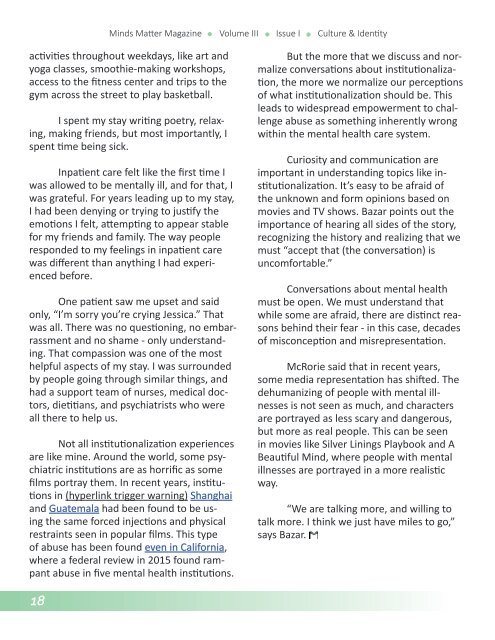Culture & Identity
You also want an ePaper? Increase the reach of your titles
YUMPU automatically turns print PDFs into web optimized ePapers that Google loves.
18<br />
Minds Matter Magazine Volume III Issue I <strong>Culture</strong> & <strong>Identity</strong><br />
activities throughout weekdays, like art and<br />
yoga classes, smoothie-making workshops,<br />
access to the fitness center and trips to the<br />
gym across the street to play basketball.<br />
I spent my stay writing poetry, relaxing,<br />
making friends, but most importantly, I<br />
spent time being sick.<br />
Inpatient care felt like the first time I<br />
was allowed to be mentally ill, and for that, I<br />
was grateful. For years leading up to my stay,<br />
I had been denying or trying to justify the<br />
emotions I felt, attempting to appear stable<br />
for my friends and family. The way people<br />
responded to my feelings in inpatient care<br />
was different than anything I had experienced<br />
before.<br />
One patient saw me upset and said<br />
only, “I’m sorry you’re crying Jessica.” That<br />
was all. There was no questioning, no embarrassment<br />
and no shame - only understanding.<br />
That compassion was one of the most<br />
helpful aspects of my stay. I was surrounded<br />
by people going through similar things, and<br />
had a support team of nurses, medical doctors,<br />
dietitians, and psychiatrists who were<br />
all there to help us.<br />
Not all institutionalization experiences<br />
are like mine. Around the world, some psychiatric<br />
institutions are as horrific as some<br />
films portray them. In recent years, institutions<br />
in (hyperlink trigger warning) Shanghai<br />
and Guatemala had been found to be using<br />
the same forced injections and physical<br />
restraints seen in popular films. This type<br />
of abuse has been found even in California,<br />
where a federal review in 2015 found rampant<br />
abuse in five mental health institutions.<br />
But the more that we discuss and normalize<br />
conversations about institutionalization,<br />
the more we normalize our perceptions<br />
of what institutionalization should be. This<br />
leads to widespread empowerment to challenge<br />
abuse as something inherently wrong<br />
within the mental health care system.<br />
Curiosity and communication are<br />
important in understanding topics like institutionalization.<br />
It’s easy to be afraid of<br />
the unknown and form opinions based on<br />
movies and TV shows. Bazar points out the<br />
importance of hearing all sides of the story,<br />
recognizing the history and realizing that we<br />
must “accept that (the conversation) is<br />
uncomfortable.”<br />
Conversations about mental health<br />
must be open. We must understand that<br />
while some are afraid, there are distinct reasons<br />
behind their fear - in this case, decades<br />
of misconception and misrepresentation.<br />
McRorie said that in recent years,<br />
some media representation has shifted. The<br />
dehumanizing of people with mental illnesses<br />
is not seen as much, and characters<br />
are portrayed as less scary and dangerous,<br />
but more as real people. This can be seen<br />
in movies like Silver Linings Playbook and A<br />
Beautiful Mind, where people with mental<br />
illnesses are portrayed in a more realistic<br />
way.<br />
“We are talking more, and willing to<br />
talk more. I think we just have miles to go,”<br />
says Bazar.<br />
Stories of mental illness<br />
from the West Indies<br />
Victoria Gibson Billings<br />
Exploring the intersection of cultural stigma and modern mental health through<br />
stories.<br />
Image By Adley Lobo






